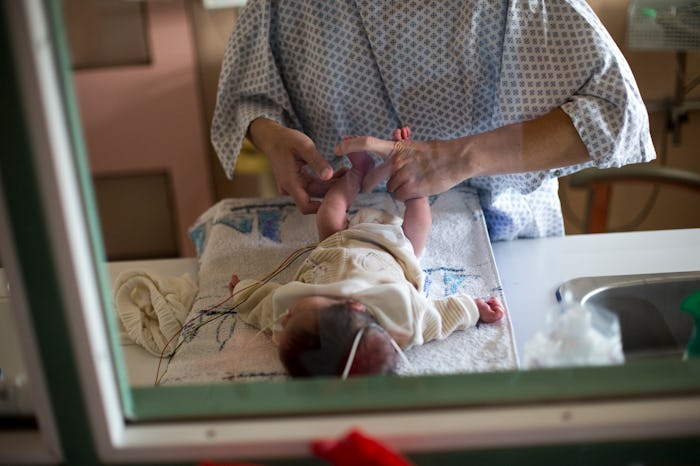Life

Breast Milk May Help Preemies Catch Up In Growth & Development, Study Finds
There might be a very simple fix when it comes to helping premature babies develop. Researchers found that of all things, breast milk may help preemies, which is very good news considering that it's an all-natural and, well, basically free, way to treat tiny babies. According to a study done at Penn State University, the breast milk of mothers who give birth early has different levels of microRNA, or the pieces of RNA that have an effect on "gene expression," than the breast milk of mothers who have babies at full term.
The researchers studied the breast milk of mothers who gave birth between 28 and 37 weeks and compared its composition to the milk mothers who gave birth after 38 weeks and found that the pieces of RNA were different. Molly Carney, medical student in the Penn State College of Medicine, told Science Daily:
We found that there are differences in these microRNA profiles, and that the majority of the altered microRNAs influence metabolism. If those microRNAs are being transferred to the infant, that could potentially impact how the newborn processes energy and nutrients.
So instead of giving a premature baby donated breast milk from a mother who gave birth at full term, it would be better to feed a preemie breast milk from its own mother, or another woman, who gave birth early.
This is the first study to look specifically at the microRNAs in breast milk. The researchers were able to extract nine different strings that specifically help metabolic processes and can regulate the energy use in premature babies. It's already been well-documented that premature babies do better with breast milk than with formula — and this study might have just explained why that is.
Steven Hicks, assistant professor of pediatrics in the Penn State College of Medicine, said in a statement, according to Healthy Children:
We know that babies born prematurely have better health outcomes with breast milk than with formula, and our results may explain some of these health benefits associated with breast-feeding. The unique microRNA profiles that we found in premature breast milk seem well suited to premature infants, because they target metabolic pathways that could spark catch-up growth.
Already, most premature infants depend on donated breast milk since moms have trouble producing their own. Hicks said that most of that milk comes from moms who gave birth at full-term and have already been breastfeeding for weeks on end. However, this study shows that that milk is likely not optimal for preemies.
Which means that the results of this study are a little bitter sweet. If mothers who give birth prematurely have trouble producing milk, that means that there's less of it around for their infants, who could really all those microRNAs the most to gain weight and get out of the neonatal intensive care unit. Most mothers of premature babies have trouble producing milk in part because their bodies just aren't ready yet. Or, according to The Washington Post, the stress of being in the NICU affects supply.
Formula isn't terrible for premature infants, but it doesn't contain the epigenetic material, which is made by a body, to help premature babies. There are proteins and lipids and carbs, all of which are good. But the microRNAs are possibly what helps preemies catch up developmentally.
But there's hope. With more research, as Hicks said in the statement, it could be possible to create microRNAs in a lab and then add them to baby formula. "This approach might help bridge the health gap we see between formula- and breast-fed infants," she said.
All of this is great news, if only because the last thing a new mother with a baby in the NICU needs to feel is extra guilty for not being able to produce enough breast milk to feed her new baby.
Watch Romper's new video series, Romper's Doula Diaries:
Check out the entire Romper's Doula Diaries series and other videos on Facebook and the Bustle app across Apple TV, Roku, and Amazon Fire TV.